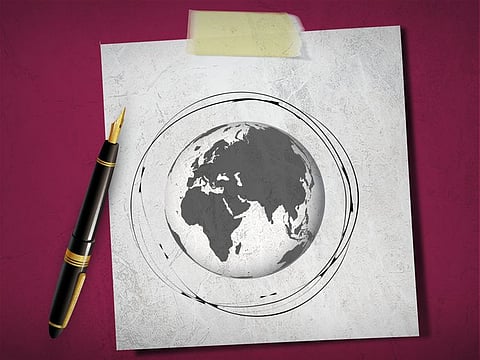War's carbon bootprint: Why climate action demands peace
Conflicts strain land resources and destabilise governance in strife-torn regions

“The basic science is well established, it is well understood that global warming is due to greenhouse gases. What is uncertain is projections about specifics in the next few decades, by how much will the climate change,” stated Mexican Nobel laureate, Mario J Molina.
It’s a fact that the current net-zero policies are inadequate to prevent further warming due to the lack of ample measures and actions.
On top of that, greenhouse gas (GHG) emissions from wars and military operations are not well reported, accounted for, or documented by many countries. That’s because ambiguity in international climate agreements does not require nations to include military emissions in their reports.
The excuse occurred in 1997, during the Kyoto Protocol negotiations, when the US insisted on excluding emissions from multilateral operations, activities that involve more than one country, and ships and aircraft associated with global transport.
Though the Paris Agreement did not include exemptions for military emissions; it was at the nations’ discretion to declare it. Therefore, the data relies on estimates from independent researchers and organisations and the methods for documenting the GHG impacts.
Military emissions
During COP27 in Glasgow, Scotland, in 2021, climate activists, academics, and civil society organisations stressed the inclusion of military emissions on the formal agenda of the UN meeting. More than 200 civil society groups, including Amnesty International and Human Rights Watch, signed the Conflict and Environment Observatory’s call for governments to reduce emissions from military operations.
They argued that war and climate change were interlinked and that addressing one required addressing the other.
The international community was urged to adopt a human rights-based approach to climate action and ensure the vulnerable and affected are protected. However, with more than 2 per cent of the global emissions not reported and remaining data classified, warming remains under limited control.
Thus, experts call for unprecedented and immediate action to transform net zero from aspiration to reality.
GHG emissions are directly related to conflicts. The various pollutant gases, carbon dioxide (CO2), methane, nitrous oxide, and fluorinated gases have enveloped the Earth’s atmosphere, resulting in people gasping for air.
A study by the International Energy Agency and the Stockholm International Peace Research Institute stated that the world’s armed forces emitted about 1.2 billion tonnes of CO2 (about 2.3 per cent of the global total carbon emissions) in 2019. The US, the largest contributor to military operations, emitted about 205 million tonnes of carbon dioxide equivalent (CO2e), corresponding to 0.4 per cent of the global total.
However, these estimates do not include emissions from industries that supply arms and equipment or the environmental damage and displacement caused by wars and conflicts.
Net-zero vagueness
It’s evident that things should have been done differently for a climate-safe environment. The stipulations in the Paris Agreement are not strict to prevent or delay the progression of climate change.
While ‘net-zero’ and ‘carbon neutrality’ share a common goal of reducing GHG emissions, they bear nuanced distinctions in meaning and scope. Net-zero amalgamates an array of commitments and initiatives. It mandates exhaustive emissions reduction at source, with the extraction of any natural or technological residual emissions.
Despite the potential advantages of net-zero policies to improve public health, bolster energy security, and create novel economic prospects, these are falling short. The net-zero approach is not a solution for addressing the climate crisis, it must complement other policies and measure its root causes and consequences.
Even though over 120 countries voiced their intent to attain net-zero emissions by 2050, as of 2024, a huge gap persists between commitments and actions.
Make peace, not war
Wars are one of the crucial reasons for this setback. The Israel and Hamas conflict has displaced millions, and thousands have been killed, thus dividing the world into groups. It has affected the climate with the heat trapped in the atmosphere leading to warmer regions.
According to the Social Science Research Network report, global warming emissions generated during the first two months of the conflict in Gaza since late 2023, were higher than the annual carbon footprints of more than 20 of the world’s most climate-vulnerable nations.
Benjamin Neimark, a senior lecturer at Queen Mary, University of London, and co-author of the research stated, “This study is only a snapshot of the larger military bootprint of war … a partial picture of the massive carbon emissions and wider toxic pollutants that will remain long after the fighting is over.”
Similarly, in the Russia-Ukraine conflict, which entered its third year after beginning in February 2022, the estimates were mind-blowing.
The UN data stated that constant bombardment by Russia in Ukraine led to blanket contamination of air, water, and soil due to chemicals and toxic gases. Nearly 30 per cent of Ukraine’s arid land is not fit for plantation. Moreover, wildfires and demolished buildings due to air and ground strikes have led to rising pollutants and multiplying respiratory diseases.
Several nations are initiating and trying to prevent and resolve conflicts. It’s time to come together to see how the treaty could be amended to make it effective and ambitious. Countries ratifying it know they can get away with it and continue polluting and emitting GHGs at an alarming rate.
Since lack of enforcement undermines its effectiveness, rigorous measures against the violators are mandatory.
Dr Abdullah Belhaif Al Nuaimi is Chairman of the Advisory Council of the Emirate of Sharjah
(The above text includes extracts from this author’s recently published book Climate Change Enigma: A Delicate Balance).



